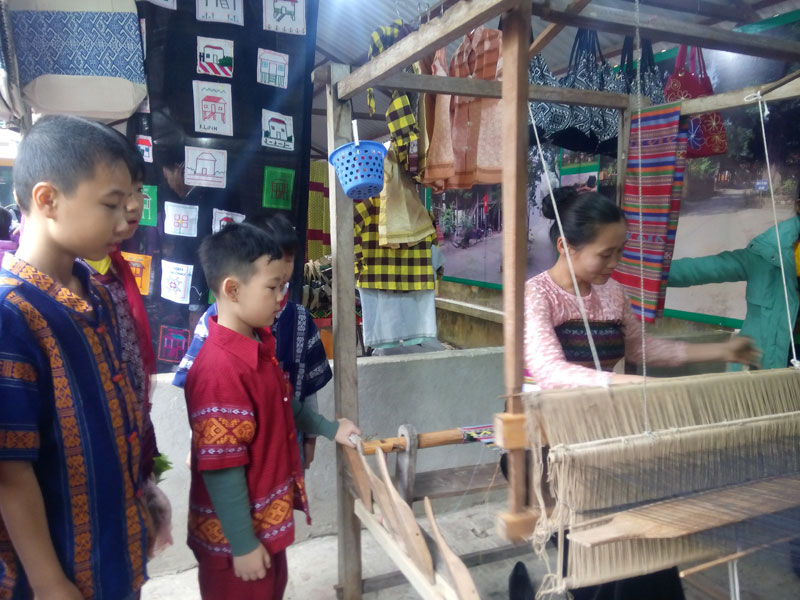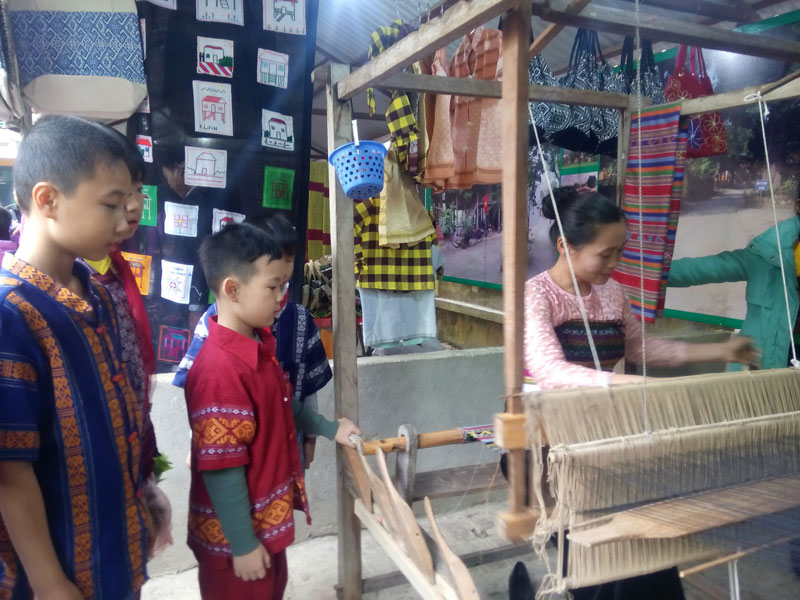
(HBO) - To contribute to preserving and promoting cultural identities of ethnic groups in Mai Chau, at the beginning of the school year 2017 - 2018, Mai Chau Town Primary School launched a movement that students attending classes will wear ethnic costume at least one day per week in a bid to help them deeply understand, respect and be proud of traditional beauty of their ethnicity.

Pupils of Mai Chau Town Primary School had a
chance to experience community tourism, which contributes to educating children
to appreciate the value of ethnic cultural identity.
In this year, there are 303 Thai-ethnic
students, 198 Kinh (Viet)-ethnic students, 18 Mong-ethnic students, 15
Muong-ethnic students and others such as Dao and Tay ones.
Based on that, the school encourages children
to wear their ethnic traditional costumes. This does not only help them
remember the features of how to sew, how to embroider each pattern and motif,
and understand the meaning that the older generation impart to each set of
costumes, but also create a colorful picture of ethnic communities in the highland
districts (Mai Chau).
Bao Ngoc Ha, a student of class 5A1 in Mai
Chau Town Primary School, told: "I’m a Thai-ethnic student. At the beginning of
year, my mother sewed a Thai girl ethnic costume. When I was wearing to attend
the class, I felt very proud of my ethnicity. Moreover, after the studying time
in classes, I usually help my mother embroider a lot of patterns in order to
sew on pictures, handbags, scarfs and dressed which are advertised for
tourists.
Not only encouraging to wear ethnic costumes
as uniforms in the school, but the school also organizes folk songs and
traditional games at the time of outdoor activities or in the break time in a
purpose of that students can relax after stressful days of classes. These
activities are favorited by many students and teachers, and the atmosphere in
school also begins exciting and bustling. Therefore, every day for students to
go to school is a happy day and the quality of study is also improved
significantly.
Ms. Thanh Nhan Mai, a teacher managing youth
union as well as a trade union chairwoman of school, said that perceiving and
educating about ethnic traditions for the young generations are necessary to
conserve and maintain cultural identities of ethnic groups in the future.
Furthermore, students can discovery more features which are familiar to daily
life, therefore, every edge of classes or traditional rooms of school are
decorated carefully by students and teachers. They also collect many stuffs to
make geometric models for everyone to visit, learn and help them more love and
be proud of local cultures.
With an increasingly vibrant and widespread emulation movement aimed at building cultured residential areas and cultured families, Yen Thuy District has been making steady progress toward improving both the material and spiritual well-being of its people, while fostering a civilized, prosperous, beautiful, and progressive community.
Once lacking recreational spaces and community facilities, Residential Group 2 in Quynh Lam Ward (Hoa Binh City) has recently received attention for the construction of a new, spacious, and fully equipped cultural house. The project followed the model of state support combined with public contributions in both labor and funding.
The "All people unite to build cultural life" movement, which has been effectively integrated with Kim Boi district’s socio-economic development goals, is fostering a lively spirit of emulation across local residential areas, hamlets, villages, public agencies, and enterprises. In addition, through the initiative, traditional cultural values are being preserved and promoted, while community solidarity and mutual support in poverty reduction and economic development are being strengthened.
A working delegation of the Hoa Binh provincial People’s Committee led by its Permanent Vice Chairman Nguyen Van Toan on June 11 inspected the progress of a project to build the Mo Muong Cultural Heritage Conservation Space linked to tourism services in Hop Phong commune, Cao Phong district.
Born and growing in the heroic land of Muong Dong, Dinh Thi Kieu Dung, a resident in Bo town of Kim Boi district, in her childhood was nurtured by the sweet lullabies of her grandmother and mother. These melodies deeply imprinted on her soul, becoming an inseparable part of her love for her ethnic group's culture. For over 20 years, this love for her hometown has driven Dung to research, collect, and pass down the cultural values of the Muong people to future generations.
In the final days of May, the Ethnic Art Troupe of Hoa Binh Province organized performances to serve the people in remote, mountainous, and particularly disadvantaged areas within the province. These were not just ordinary artistic shows, but they were the meaningful journeys aimed at spreading cultural values, enhancing the spiritual life of the people and contributing to the preservation of ethnic minority cultural identities.



